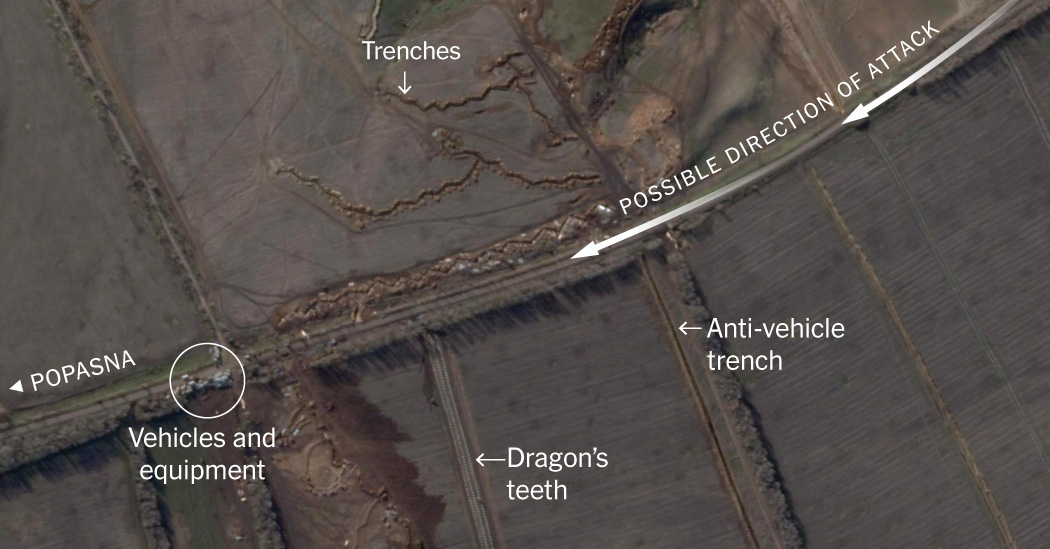Russia’s defenses across Ukraine
Russia is building a vast network of trenches, traps and obstacles to try to slow Ukraine’s momentum in the war, with new structures being constructed in a matter of days, according to a Times analysis of satellite radar data. The fortifications, often built near natural obstacles like rivers, are designed to slow Ukrainian vehicles and force them into preset positions where Russian forces can target them.
Trenches are not new to Ukraine. Trench warfare has long been a feature of the battle for the Donbas region, in the eastern part of the country. Ukrainians fight from their own trenches on their side of the line near Popasna, where Russians are aiming to dislodge Ukrainian troops from the city of Bakhmut. But the pace and scale of Russian construction over the past couple of months is unmatched.
The fortifications could slow Ukraine’s army — but they are effective only if manned correctly by Russian troops, experts say. “These are just holes in the ground unless they are held by motivated, disciplined soldiers who are supported by artillery, mobile reserves and logistics,” said one analyst.
On the ground: Russia remains on the offensive near Bakhmut, slamming it with artillery and slowly gaining ground to the east and the south of the city over the past two weeks. The new construction provides several defensible positions to retreat to, should the Ukrainians counterattack.
In other news from the war:
-
Paul Whelan, an American detained in Russia on charges of spying, has no clear path to release, despite the fact that he was detained long before two other Americans who have since been released.
Britain’s ‘winter of discontent’
With a triple whammy of frigid weather, an early snowfall and crippling strikes across multiple industries, Britain faces what the London tabloids have labeled another winter of discontent.
Those striking include postal workers and railway employees; as many as 100,000 nurses; driving-test examiners at motor-vehicle departments; baggage handlers; bus drivers; road crews; and energy-company employees. The newspapers have taken to publishing color-coded calendars to help readers keep track of which services will be interrupted on what date.
The proliferating labor unrest has drawn comparisons to the original winter of discontent, in 1978 and ’79, when public- and private-sector strikes paralyzed the country — ultimately toppling the Labour government and ushering in a decade of Conservative rule under Margaret Thatcher. Today, trade unions are not as strong as they once were, but the political danger to the current Conservative government is still acute.
A sea of troubles: Rishi Sunak, the British prime minister, is grappling with a surfeit of other problems: double-digit inflation, rising interest rates and a recession. Speaking to the British news media, he said that he planned to introduce anti-strike legislation next year and that it was “not right” to cause “such misery and disruption” at Christmas time.
A World Cup semifinal about more than sports
In a closely watched semifinal, France beat Morocco, dashing the hopes of millions of Arab and African supporters with a 2-0 victory. “On some level this will always be Morocco’s World Cup,” writes Rory Smith, our chief soccer correspondent, “the one that made it a trailblazer, a record-breaker, a watermark that will not fade.”
It was a match that went far beyond simple sports: France ran a protectorate in Morocco from 1912 to 1956, when Morocco gained independence. France has an uneasy relationship with its North-African population, even as the two countries have mostly cordial relations.
Morocco’s magical run in the tournament has elated fans: It was the first Arab or African team to reach the semifinals. France surged in the second half, when it scored another goal. Now, despite its loss, Morocco has become the champion of the world’s colonized against the world’s colonizers.
Over a period of decades, hundreds of children were secretly buried under the playground at an Irish home for unwed mothers in Tuam, County Galway.
For years after their discovery, the children’s bones remained in the ground as Ireland embarked on a yearslong odyssey to resolution — a painful journey of investigation, self-recrimination, bureaucratic delay, avoidance and grief. Now, a resolution is finally near.
SPORTS NEWS FROM THE ATHLETIC
World Cup final set: Heavyweights France and Argentina will meet on Sunday, pitting the present and future faces of soccer against each other. It’ll be Lionel Messi’s final chance to secure the trophy, while 23-year-old Kylian Mbappé could be in line for his second.
It’s OK to debate if Messi is the greatest: Soccer is a game of opinions, until you dare talk about comparing greats. This column insists you ignore the naysayers.
Croatia and Morocco proved World Cups cannot be bought: In an era of club soccer dominated by the rich, the success of less lavish nations at this year’s World Cup makes for a refreshing change.
From The Times: The sports journalist Grant Wahl, who died suddenly in Qatar, had a tear in the ascending aorta, resulting in an aneurysm, according to an autopsy conducted in New York.
ARTS AND IDEAS
Eddie Izzard’s solo turn on Broadway
In “Great Expectations,” which opens today on Broadway, the British actor and comedian Eddie Izzard plays the orphaned Pip, the forsaken Miss Havisham, the alluring Estella, the desperate Magwitch and 15 or so others — every part, in fact.
And though the play, an adaptation of the novel by Charles Dickens, is not explicitly a comic tale, “Izzard pulls moments of levity from the very air,” Lauren Collin-Hughes writes, bringing “her own arch humor to a multiple-character technique” that Izzard ascribes to the comedian Richard Pryor, a virtuoso of the crowded solo stage.
At 60, Izzard is ready to dig in — and to demonstrate what she’s capable of. “Drama is something I’ve always wanted to do from the beginning, and just went a long way round to get to it,” she said. She has lately been preparing a solo “Hamlet” with Selina Cadell, the director of “Great Expectations.”
Izzard prefers she/her pronouns, but said that the decision was all but taken out of her hands after the host of a TV program asked her which she would prefer. “I went, ‘Ahh, oh, she,” she said. “I’d been thinking of changing them. And then the program went out, and the whole world changed them.” It was, she said, “a great honor.”



